Tourism is a significant part of Indonesia’s economy, accounting for about 5% of the country’s gross domestic product. Certainly, most people throng this Asian territory to marvel at its grand geographical formation that is home to one of the richest biodiversities in the world.
Among the world’s most expansive archipelago, Indonesia’s 17,508 islands present a vast array of attractions, with some being popular surf destinations. Others usher visitors to panoramic shades of nature’s beauty, comprising a vast ocean, thriving wildlife, lush green hills, and a delightful cultural heritage.
Her gorgeous islands, virgin beaches, and fascinating adventure prospects leave little room for questions as to why digital nomads are trooping in to share the experience as they work remotely.

According to the ex-pat insider survey, 2022, Indonesia performs exceptionally well in the Ease of Settling In Index, with 90% (vs. 66% internationally) of ex-pats saying Indonesians are generally kind and friendly towards foreign residents.
That being said, l invite you to a detailed look at why this island nation is gradually becoming a favorite destination for digital nomads drawn from a pleasant mix of professions and nationalities.
But first, where do you begin your travel plans to Indonesia?
The Visa application
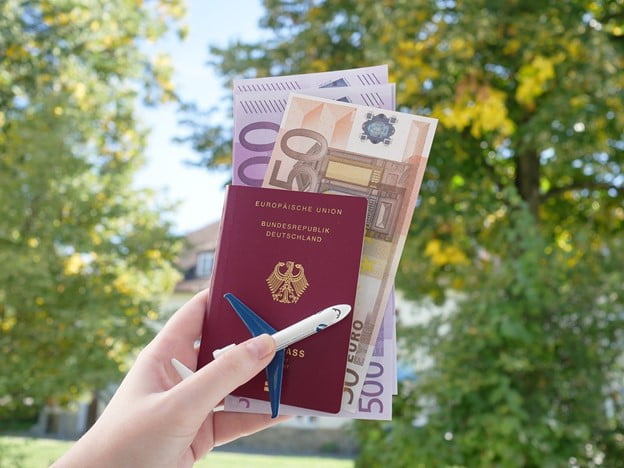
Indonesia regards tourism highly. It is among the few (if not the only) service sectors listed alongside nine export commodities contributing highly to the country’s foreign exchange account. The nine include paper and paper products, textiles, processed food, gas, electrical equipment, chemicals, apparel, processed rubber, and palm oil.
Given the significance of tourism to its economy, Indonesia continues to position itself as a visitor-friendly destination by making it easier for travelers to apply for and get a visa.
The visa application process
Most Indonesian visas require the applicant to fill out an application form to initiate the process. You may also be required to produce supporting documents that vary depending on the visa type.
While the online application option is easier and more convenient, some application forms can only be submitted in person at an Indonesian consulate or embassy. In the latter case, the procedure may be a bit longer, with some applications requiring appointments and an interview.
Are there any visa exemptions?
Indonesia’s list of visa-exempt nations is more generous if compared to a country like Thailand. Citizens of 169 countries can enter Indonesia without a visa and vacation for 30 days. This means a digital nomad from these countries can take advantage of the offer. However, if you wish to extend your stay, you must apply for a relevant visa.
To be allowed in Indonesia without a visa, you would need the following;
- Valid passport (at least six months from the date of arrival)
- A return ticket or a ticket to a new destination.
Travelers who are not from one of the Indonesia visa-free countries listed here need to apply for an entry permit, even for short stays.
Allowed visa-free tour activities.
Visa-exempt visitors are allowed on condition that they restrict themselves to the following activities;
- Official government missions
- Tourism
- Attending a seminar or giving a lecture
- Transit through Indonesia
- Art and cultural functions
- Visiting family
- Attending a meeting with a company’s representative in Indonesia
Working is disallowed, but regulating digital nomads under such a requirement is difficult since most of them work within the safety of their hotel rooms.
Filling out the visa application form.
Different visas bear questions that are unique to the visa type. For example, the tourist visa application forms may require the following details.
- A visa application form that you must fill out and sign. Get it from their offices or the Embassy website
- The applicant’s full name, date of birth, and nationality
- Travel plans
- Passport details such as the place and date of issue, document number, and expiration date.
- Contact details, including the email address, home address, and phone number.
To apply for an Indonesian tourist visa, you need several supportive documents;
- A valid passport. (at least six months from the day you will enter Indonesia)
- Passport size photo
– 4cm x 6cm or 3cm x 4cm
– White background
– Eyes must stare straight ahead
– Even with a religious headgear, your face must be visible
- Specific eyeglasses frame, if any.
- Return ticket
- Proof of financial stability
- Proof of payment for the visa
Some travelers may be required to share their health history and criminal status in exceptional cases.
The digital nomad visa.
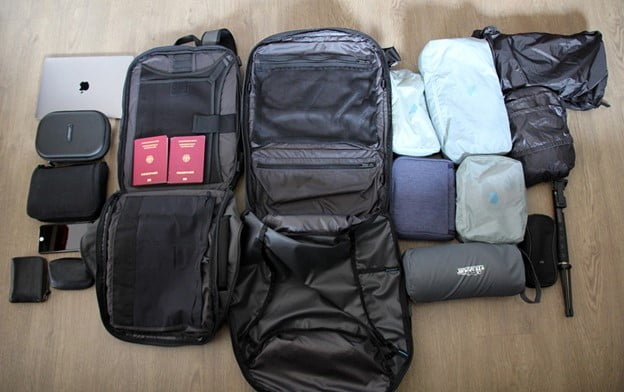
In recent years, most Indonesian islands, especially Bali, have seen an increase in the number of visitors from overseas, and most of them would love to stay longer as they combine travel, remote working, and recreation. Sensing potential economic benefits associated with the group, the Indonesian government has announced plans to launch a digital nomad visa.
Before this announcement, digital nomads had already been working remotely in the country, but their stay was limited to the amount of time regulated by the following visas;
- 30 days on the visa on arrival (VOA)
- 60 days on an extendable tourist visa
- 180 days (six months) on a business visa
- 1 year and renewable KITAS Retirement Visa
The decision to introduce an Indonesian digital nomad visa is largely inspired by the country’s aspiration to host 3.6 million ex-pats and freelancers by 2023, departing from sun-seeker tourism to adopt a more sustainable model. Besides digital nomadism, the new visa is also intended to woo more visitors for spiritual retreats, eco-tourism, and long-term high spenders.
Reporting on the issue, Reuters quoted the tourism minister, Sandiaga Uno, having said,
“I am convinced the number of foreign tourists interested in staying in Indonesia will increase and have a significant impact on our economic revival.”
While everyone is expecting more details on this visa’s requirements, applicants will certainly require a valid passport and proof of a remote working station or clients located in other countries.
The Cost of applying for a visa
Visa costs generally depend on the visa type and the applicant’s country of origin. The Indonesian digital nomad visa cost is undisclosed, but other nomad-friendly visas would go for any amount between $35 – $100. For example, the Indonesia Tourist Visa fees for some countries may be as follows;
- Visa on arrival $35
- Single entry – $50
- Multiple entries – $100
Difficulty in Visa application
If you are planning to visit Indonesia, you will most likely not need a visa, thanks to the lenient Indonesian visa policy. For stays of up to thirty days, only nationals from 28 countries should apply for a visa. The difficulty encountered by applicants from some of these countries may partly be attributed to the unstable political situations in their countries. Others may be due to their countries’ controversial foreign policies.
Accordingly, visitors from jurisdictions neither captured on the list of 28 countries nor the visa except list can apply for an Indonesian Visa on Arrival (VoA).
Club Swan members can request their virtual assistant to provide Visa application assistance.
Cities and towns popular with digital nomads
Indonesia has several urban centers that attract digital nomads, with the most visited being the capital, Jakarta, Bekasi, and the Bali resort villages of Canggu, Seminyak, and Ubud. Other popular centers around Bali include Sanur, Amed, Seseh, Kuta Uluwatu, and many others.
Jakarta City
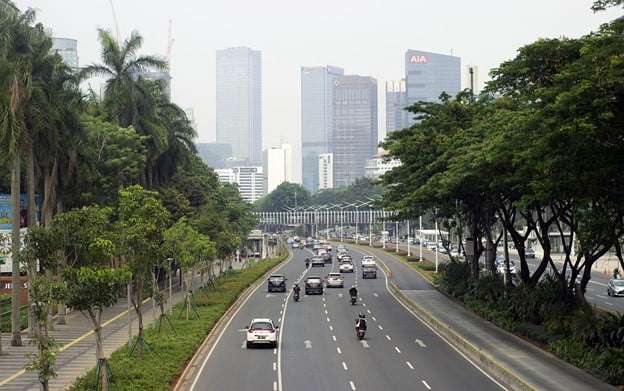
Data from worldpopulationreview.com shows that Jarkata, Indonesia, has slightly over 11 million population. Southeast Asia’s largest city currently has a massive metropolitan area comprising Jakarta, Bogor, Depok, Tangerang, and Bekasi satellite cities. These cities have over 31 million people, ranking them among the most populated urban settlements globally.
The multicultural city is a big attraction to ex-pats and digital nomads, most likely due to its low cost of living and robust economy.
Cost of living and cost of living arbitrage
According to Numbeo.com, a nomad living on $ 9,300 in New York will only need about $2274 to maintain the same lifestyle in Jakarta, saving 24.45% (plus rent, after income tax). Meanwhile, a nomad in London living on £ 5200 would need roughly £ 1995 in Jakarta. This means life in Jakarta is 38% cheaper than in London city. Whichever the case, saving $7,026 or £38,460 in a year is a goal anyone would love to achieve.
Accommodation
While in Jakarta, you have the option of staying in apartments, co-living spaces, hotels, and Airbnb. Of these options, hotels are the most expensive, especially if you plan to stay a little longer.
According to booking.com, a cheap hotel room in Jakarta costs roughly $750 monthly ($25 per night). However, high-end hotels like Pullman ask for over $3000 per month, putting the average hotel cost at around $1800. Undoubtedly, $1800 is still costly for any ordinary nomad on a cost arbitrage mission.
Therefore, if you are on a tight budget, an Airbnb studio unit at $15 per night will do. Otherwise, you could rent a cheap apartment at $14 per night or take up a co-living space which might be even cheaper.
The most popular co-living spaces include Rukia, CoHive, dwell House Antasari, Flokq, and TheSocial.House and many others.
Utilities
- Basic utilities, i.e., electricity, garbage, and water, in an 85 m2 apartment will cost you roughly $80 (1,223,403 Rp)
- 1 minute of prepaid local mobile tariff without discounts or plans would cost you roughly $0.12 (1,863 Rp)
- Internet at speeds of 60 Mbps – $29.57 (449,615.38 Rp)
Groceries
Groceries are generally cheaper in Jakarta as compared to New York City. For example, a kilo of tomatoes sells for approximately $6.22 in New York City and $1.27 in Jakarta. The Cost differs by over 75 %, and this trend cuts across other food commodities.
Internet
Most countries with digital nomad destinations strive to ensure that the internet is fast and reliable, and Indonesia is no exception. It is particularly so in areas with co-working and co-living spaces. Whether free or paid for, most rental apartments, hotels, cafes, restaurants, and public spaces also strive to improve their speeds to meet client expectations.
As of August 2022, Indonesia was running median mobile and fixed broadband internet speeds as follows;
- Mobile downloads at about 17 Mbps and uploads at 10 Mbps
- Fixed broadband downloads at 22Mbps and uploads at 10 Mbps
However, internet speeds in this city also depend on the particular service provider. For example, areas covered by MyRepublic ISP have reported crazy downloads at 136 Mbps and uploads at 71.2 Mbps. Therefore, you may want to settle in areas covered by such Internet Service Providers.
Best coworking spaces

Co-working spaces in Jakarta are in their thousands. For example, the Coworker platform hosts over 25,000 spaces, with over 300 new working spaces joining every month. In most centers, the average desk price is roughly $6 per day (approximately $180 monthly).
You may want to try some cool coworking spaces like JustCo, GoWork, Avenue8, Kolega, WeWork, and many more. Most organize numerous events around social issues, technology, and entrepreneurship.
The Indonesian Crypto Community
According to Jerry Sambuaga, the Indonesian Assistant Minister of Trade, crypto is quickly overtaking traditional stock in popularity. By March 2022, 17 crypto exchanges had been duly registered, with users increasing exponentially.
The ministry also reported that in 2021, Bitcoin transactions grew over fourteen times from $4.1 billion in 2020 to $59.83 billion. Over 11 million Indonesians acquired or sold crypto during the same period, with the Indonesian Central Securities Depository reporting the number of single investor identities at 7.35 million. 11 million investors comprise only 4% of the country’s population, meaning there is still more room to grow the crypto community.
The reported growth can be attributed to several factors, including
- Adoption by the main local tech players
- Easy access to crypto trading
- Goodwill from government regulatory bodies.
Legal status.
Indonesia treats cryptocurrencies as commodities you may trade under regulation by the Commodity Futures Trading Regulatory Agency. This body falls under the ministry of trade.
Crypto startups.
Like most other countries that have embraced blockchain, Indonesia has seen an exponential increase in crypto startups, particularly in nomad hotspots like Bali and Jakarta city. They include;
- Apricot Planet Pte.Ltd: Enables users to rent NFTs and earn by playing games.
- Ketzo: An escrow marketplace that allows you to conduct secure transactions through an integrated account.
- Blossom Finance: Supports independent micro-banks with relevant finance software to run the bank and capital to invest in the community.
Blockchain workspaces.
In early 2022, Tokyocrypto, an established crypto-assets digital exchange, launched T-Hub, a clubhouse in Bali that seeks to empower crypto communities by providing them with the necessary skills to exploit early opportunities in the crypto economy. Of course, several other entities, like the T-Hub in major cities, including blockchain meetup groups, promote cooperation, collaboration, and a sense of community.
Taxation
Effective May 1, 2022, the finance ministry set VAT on all crypto assets purchases at 0.1 percent. The state revenue body also levies a 0.1% tax on all capital gains. However, similar transactions on exchanges that the government does not authorize attract higher income tax and VAT of 0.2%, respectively.
While crypto is legal in Indonesia, the crypto community and organizations have several hurdles to overcome. First, the Indonesian central bank doesn’t recognize cryptocurrency as a means of payment. Naturally, such a position inevitably presents a challenge for widespread crypto adoption. That aside, banks are still reluctant to open crypto-related accounts owing to the central bank’s position and rampant misinformation about the nature of cryptocurrencies.
Nonetheless, there is remarkable goodwill toward establishing a comprehensive legal framework leading to wider acceptance of cryptocurrencies.
Popular recreational activities and fun spots
Most Indonesian visitors looking for fun immediately rush to Yogyakarta or the popular Bali destinations, often ignoring the capital city. Unknown to many, Jakarta is also populated with stunning architectural wonders, eccentric museums, and other interesting attractions that will give you a sneak peek into Indonesia’s colorful history and culture.
If you love to play, there are game and entertainment centers you could visit, for example, the Houbii adventure park, where you can join others in an indoor play area for activities like the ninja warrior styles, trampoline, mini zipline, climber, and 90 degrees’ slides.
Nightlife
Like other capital cities, Jakarta’s nightlife is one of a kind. The city leverages a unique blend of history and modernity to treat visitors and residents to nightlife with an unforgettable experience. From night markets, super night clubs, and jogging at night, there is just so much to do in Jakarta once the sun goes down.
Bali
Arguably, Bali is the undisputed digital nomads’ paradise and probably a destination few nomads would want to exclude from their itinerary. So far, many travel magazines, review portals, and websites have ranked it among the world’s best travel destinations because of its magical blend of culture, nature, and culinary delights, among other aspects. Besides a kind English-speaking population, the province has many coworking spaces, complete with amenities that create favorable working conditions for digital nomads.
Here are some of the best places to settle in Bali;
Canggu
Canggu is a popular spot for digital nomads. Its coastline is endowed with black-sand beaches that fascinate avid surfers who come to dare its challenging waves. Canggu’s charm is partly inspired by the surrounding neatly terraced rice fields. The city has many hip café and co-working and co-living spaces where you can mingle with fellow nomads. To relax between or after working hours, you may join a yoga session, go surfing at the beach or hang out at the numerous bars and beach clubs.
Cost of living
The Cost of living in Canggu is higher than in other cities in Bali. According to one nomad’s account, her average monthly Cost is $1250, with housing and food topping her budget list @ $330 and $496, respectively. She spends roughly $137 on entertainment, $127 on transportation, and $59 on healthcare. If you compare the data she shared between Portland US and Canggu (on the same page), you notice a cost difference of over 40%, with Canggu being cheaper.
Accommodation
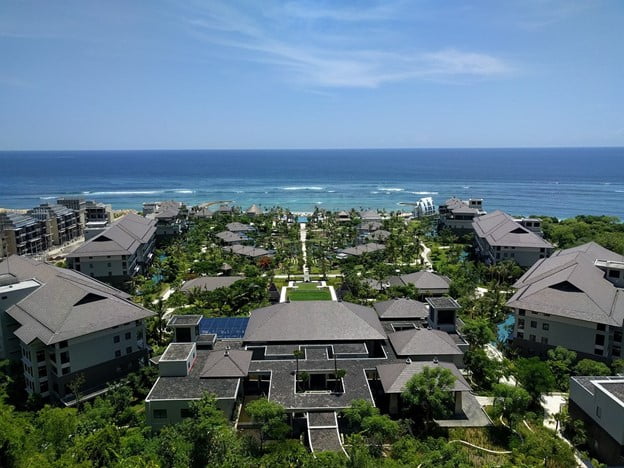
As in Jakarta, you can stay in an apartment, Airbnb, hotel, or at a co-living facility. A one-bedroom unit in an apartment costs as low as 19 euros, with Airbnb hosting asking for $15 per night or more. However, you would spend about $13 per night at a low-cost co-living facility.
Some popular co-living spaces include;
Transportation
You can get to Canggu using any of these five airports; Ngurah Rai, Juanda International Airport, Lombok Airport, and Solo Airport Labuan Bajo Airport. However, the most convenient one is Ngurah Rai. All factors being constant, it will take you about 20 minutes to complete the 17.1 km distance from Ngurah Rai Airport to Canggu.
Movement from the airport is mainly facilitated by regular taxis (i.e., Ngurah Rai Airport Taxi) and Ride-hailing services, including MyBluebird and Grab Taxi. However, once you are settled, you may consider any of these options to shuttle around town:
- Taxis
- Car Rentals
- Motorcycle & Scooter Rentals
- Bicycle Rentals
- Tourist Shuttle Buses
- Boats
Fares vary depending on your destination, and in Bali province, you will pay anything between $3 – $22 on average.
Internet
Currently, Bali runs on average median download speeds of 24.07 Mbps and 14.01 Mbps for uploads. To incentivize clients, most living apartments, hotels, Airbnb, and co-living spaces offer free Wi-Fi.
Co-working spaces
As a popular digital nomad center, Canggu has many co-working spaces, with major ones being
On average, a decent co-working space would go for about $100 per month.
The Crypto Community

Jerry Sambuaga, the Indonesian Assistant Minister of Trade, has stated that crypto is quickly overtaking traditional stock in popularity. By March 2022, 17 crypto exchanges had been duly registered, with users increasing exponentially. Accordingly, Tokyocrypto, an established crypto-assets digital exchange, launched T-Hub, a crypto clubhouse in Bali that seeks to empower crypto communities by providing them with the necessary skills to exploit early opportunities in the crypto economy.
Popular recreational activities and fun spots
Famed as the ultimate fun paradise by many, there is seemingly no end to the list of fun activities you may indulge in around Canggu. For example, for just 85 dollars, you could take a tour around traditional villages for a sightseeing excursion. Snorkeling at a lagoon beach, motorcycling tours, and sunrise trekking tours are the other activities you may take up for fun and fitness.
Only some areas would match the Bali region as far as island hopping is concerned. The sheer architecture and natural infrastructure that bonds the islands of Bali, Nusa Penida, Lembongan, Lombok, and Gilli islands make island hopping such an enticing adventure.
If you cherish evenings or night outs, there are many trusted hotspots to visit. For example, La Brissa is an exciting beach club where you may hang out for wining and dining through late-night parties.
Security and safety concerns

While crime is not exclusive to Indonesia, it is a major problem, particularly in populated cities like Jakarta and Surabaya. But overall, the current crime statistics don’t warrant a serious threat. Compared to countries plagued by gun violence like the US, Indonesia’s reported murder rate of 8 homicides for every 100000 people renders it a relatively safe city.
Typical crimes include notorious gangs extorting protection fees from open-air market traders and insecure neighborhoods. Others hire out their services to corrupt business people to eliminate competition and commit other crimes, including
- Robbing airport-bound taxis
- Armed carjacking and ransom kidnapping
- Bank robberies
- Drug trafficking
- Cyber crimes
- Credit card fraud
- Counterfeiting
- Separatist violence
- Nonviolent residential break-ins
- Fomenting religious terrorism and animosity
- Election bribery and violence
Expats and digital nomads suffer more at the hands of “snatch and run” thieves. In isolated incidents, thug-minded taxi drivers deliver their passengers to criminal hideouts and have them stripped of their cell phones, jewelry, and other valuables. Some victims are driven to their nearest bank branches and compelled to reveal their ATM PINs for forceful withdrawals.
You are therefore advised to use only reputable taxi firms such as Silver Bird, Grab, Express, or Blue Bird.
Pickpocketing is another menace that bedevils locals, digital nomads, and ex-pats alike. To deal with pickpockets, avoid crowded and noisy areas such as bars and mass transit systems like buses and trains.
Do’s and don’ts
- Do not leave your valuables unattended in crowded, public places like the beach.
- Avoid lengthy conversations with strangers.
- Save the emergency numbers to call beginning with 110
- Do not expose your phone unless when using it
- Always stay alert
Cultural and social norms
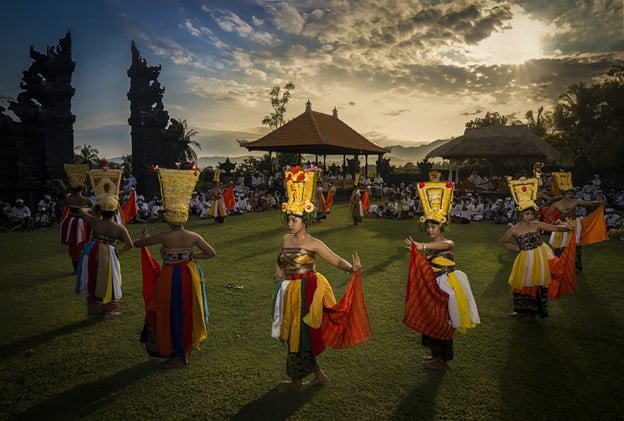
Indonesia comprises at least 300 ethnic groups, which makes it difficult to single out a representative culture. For this Southeast Asian nation, religion plays a key role in her social and cultural differences. Fortunately, some distinct similarities or tendencies may aid in blending its cultural diversity.
Here are some cultural do’s and don’ts,
Do’s
1) Dress appropriately.
Nudity, even in its moderate sense, is largely unacceptable in this part of the world. Your dress should always be appropriate, especially when visiting royal palaces, mosques, or temples. In this case, appropriate dressing means covering your shoulders and knees and wearing clothes that aren’t suggestively tight.
2) Take off your shoes.
Most westerners are taken aback by this cultural requirement to take off one’s shoes when visiting a friend or entering a religious sanctuary. Accordingly, some business centers also apply the rule, so you should remain open-minded. If you are unsure when to comply, always keep an open eye for a stockpile of footwear at the building’s entrance.
3) Learn a bit of the local language
Locals are always fascinated hearing a foreigner striving to use basic words in their language. Using the local version of everyday phrases like “thank you,” “how are you,” and “thank you” goes a long way to getting their full attention and necessary assistance.
Indonesians are generally warm and kind-hearted. Wherever you go, expect lots of attention and invitations. Therefore, whenever you hit the language barrier and can’t express yourself, smile as you leverage basic sign language.
Don’ts
1) Do not use your left hand.
For most local and practical reasons, Indonesians consider the left hand dirty. Everyone greets, eats, and handles money using their right. Therefore, if you are a left-handed tourist, you better train your right hand to take charge.
2) Do not raise your voice or act aggressively.
Some Indonesians, particularly the Javanese, are well-mannered and respectful people. They have a unique set of rules that govern public behavior. And, while they absorb offense and aggression with a calm and collected demeanor, such a trend is generally unacceptable.
3) Measure your public display of affection (PDA).
Although sections of Indonesia, especially Bali province, are known for their liberal behavior, other areas still uphold their conservative values. Therefore, going on a romantic overdrive to a canoodle, even your wife of 40 years, in public would be considered strange. LGBT rights have not been fully adjudicated upon; therefore, if you are a member of that community, it would be better not to express your sexuality publicly.
Religious composition
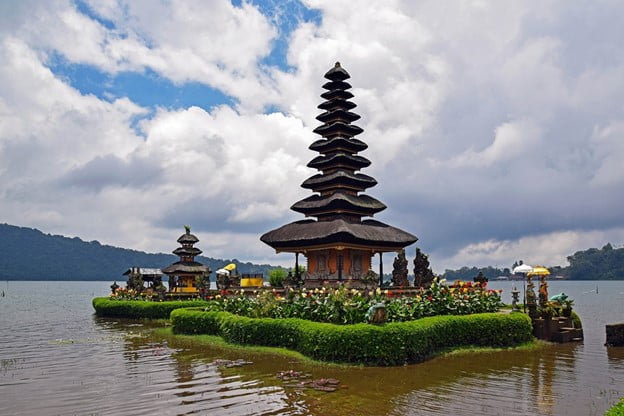
Indonesia is a secular democratic nation with a Muslim-majority population. The country’s constitution guarantees everyone the freedom of worship according to their religion or individual belief. It also dictates that the state shall be established upon the belief in the “one and only God.” The first principle of the Pancasila, which is the Indonesian state philosophy, is also inspired by this belief.
Muslims form 87.2% of the religious population, with Christians coming second at 9.8%. Hindus and Buddhists combined form 2.4%. It should, however, be noted that the mentioned religions do not necessarily form coherent groups.
For example, devout Muslims subscribe to mosque worship, scripture, and ritual. For such, Islam shapes their lifestyles. However, some only identify with Islam according to their family background. They rarely go to the mosque, pray or read the Quran. This cuts across other religions as well.
Political and economic stability

As the leading economy in the Southeast Asian community, Indonesia has been on an impressive economic trajectory since the 1997-1998 Asian financial crisis. Currently, it ranks as the 4th most populous nation, which has helped it hold 8th place on the 2022 Purchasing Power Parity list. A recent report by the Asian Development Bank hinted at the country’s economy growing by 5.4% and 5.0% in 2022 and 2023, respectively. The projected dip in 2023 is premised on four possible reasons;
- The slow global economic growth,
- The global financial volatility
- Indonesia’s tight macroeconomic policy
- The prolonged war in Ukraine.
Indonesia is fairly stable Politically. The directly elected president doubles up as the head of state and head of government. Constitutionally, the president and his deputy can hold office for two five-year terms.
Language and language barriers
Most estimates place Indonesia among the most linguistically diverse countries globally. According to the 2010 census, Indonesians speak over 800 languages, of which less than 700 are unique. The rest are considered variants or dialects of the main languages. Bahasa Indonesia, the country’s primary lingua franca, is spoken by about 95 % of the population.
In a recent English proficiency indexing exercise, Indonesia garnered an EF EPI score of 466, placing 80 out of 112 and 14 out of 24 in Asia. This performance is abysmal, given the country’s strategic importance as a digital nomad destination.
Other languages are spoken widely
Javanese is the most widely spoken indigenous language because the Javanese are the most populous ethnic group. They account for about 45% of the population. Other languages include Sundanese, Buginese, Tetum of Timor, Toraja, Ceramese, Dayak, Minahasa, Sasak, Ambonese, and a few Irianese languages.
Healthcare

In keeping with Sustainable Development Goal 3.3 (SDG goal 3.3), Indonesia is committed to ending Malaria, Hepatitis, AIDS, TB, AIDS, and Waterborne diseases by 2030.
Common infectious diseases
Data from statistica.com shows that over 300,000 cases of malaria infections were reported in 2021. Dengue fever cases were approximately 73,500, with tuberculosis registering 397,000 cases. This compels you to have a well-treated mosquito net to protect yourself from mosquitoes.
Hospitals
Indonesia offers a wide range of private and public hospitals (roughly 1800), some of which are known for their world-class service delivery. The clinics and hospitals are open to locals and ex-pats needing medical attention. To compare the hospital status and the quality of service delivery, you may sample the following units.
- The Medistra Hospital,
- Rumah Sakit Umum Pusat Nasional
- Premier Bintaro Hospital
- Siloam Hospitals Kebon Jeruk
- Jakarta Eye Center
Health Insurance
Numbeo.com ranks Indonesia’s healthcare system at number 56 with a 60.48 healthcare index. Digital nomads and ex-pats on an extended stay mostly use private insurance since they are not captured in the country’s universal healthcare system. On the brighter side, a working ex-pat may obtain health insurance through their employer.
Healthcare quality.
Indonesia’s healthcare system generally has few bright spots but with numerous challenges. Ranked 92nd by the world health organization in 2020, the country has since embarked on an ambitious roadmap to improving universal healthcare access for locals and ex-pats. And, although patient facilities continue to improve in cities like Jakarta, the overall healthcare standards leave a lot to be desired. (by international standards)
Vaccination
The Center for Disease Control and Prevention (CDC) recommends getting the following routine vaccines before heading to Indonesia:
- Chickenpox (Varicella)
- Shingles
- Measles-Mumps-Rubella (MMR)
- Flu (influenza)
- Diphtheria-Tetanus-Pertussis
- Flu (influenza)
- Measles-Mumps-Rubella (MMR)
- Polio.
You should also be vaccinated against Covid-19, Hepatitis A & B, Rabies, Malaria, measles, and Japanese Encephalitis.
Electronic standards
Indonesia runs on a 230 V standard voltage with a 50Hz frequency. Therefore, visitors from the UK, Australia, Africa, and most of Asia should be able to charge their electronic gadgets normally. However, if you are from the US, Canada, and several other South American countries, you will experience challenges arising from voltage differences. In this case, you need a voltage converter to mitigate the risks voltage differences pose against your gadgets.
Telephone and internet plan
Indonesia has several mobile phone service providers, the more popular ones being Telkomsel, Net1 Indonesia Indosat Ooreedoo, Smartfren, XLAxiata, and another one known as three. Telkomsel has distributed many Base Transceiver Stations around the country to give it excellent coverage deep in rural areas.
How to buy a SIM card
You can buy a SIM card from vendors at the airport for at least $0.3. An individual company determines the price.
The population of ex-pats
With accurate data about the exact number of ex-pats unavailable, it is estimated that Indonesia has approximately 100,000 ex-pats. What is reliably known is that by 2018, roughly 56% of ex-pats in Indonesia were between 18-34 years, meaning the country is a favorite destination for young ex-pats.
Payment services and infrastructure
Indonesia’s youthful population (averaging 30 years) presents massive potential for an eCommerce revolution. The country is experiencing a shift in payment methods, with mobile payments and digital wallets steadily taking over. Many digitally connected people leverage smartphones to access popular mobile wallets like DOKU VA, DOKU Wallet, Dana, Alfamart, GoPay, and PayPal.
You cannot pay directly for goods and services using crypto
Accessible international payment services.
MasterCard and Visa, card payment solutions are available.
Currencies and exchange rates
The Rupiah is Indonesia’s official currency. It bears the initials IDR as the currency code and Rp as its symbol. As of October 2022, One Indonesian Rupiah equals 0.000065 United States Dollars. Once you arrive in the country, you can convert your cash in the forex bureau or ATM using a MasterCard or Visa card.
Climate and seasons
Indonesia generally runs on a tropical climate with two seasons. The dry season begins from April to October and the monsoon season from November to March. Overall, the country experiences hot and humid temperatures throughout the year. However, the monsoon can be irritating and make traveling to some islands a bad experience. Here is a list of the ideal times to visit specific regions in the country
- Sumatra – April to October.
- Nusa Tenggara –August and September
- Bali – April to September
- Java- April to October
Favorite food
Famed as home to various herbs and spices, Indonesia offers a lengthy list of mouthwatering dishes. The signature recipes inherited from earlier generations have been updated by modern culinary practices.
Once you enter the country, expect to sample finger-licking dishes, including Nasi Goreng, Rendang, Bakso, and Martabak.
If you do not have the time to curate a culinary list yourself, reach out to your Club Swan virtual assistant who will gladly curate a list of top tier restaurants, hidden gems and best meals for their value. Lists can be obtained as frequently as you wish.
Tax requirements on digital nomads

Holders of the anticipated Indonesian digital nomad visa will not be taxed as long as they are paid from abroad.
Common concerns
Many social problems remain unresolved in Indonesia. There are reports of corruption, human rights violations, scandals, and poverty. Some areas, including Eastern Bali and West Timor, experience periodic episodes of communal conflict.
Other issues to warrant a digital nomad’s concern are petty crime, congested streets, and poor water quality.
Otherwise, the sprawling Indonesian archipelago remains a digital nomad’s haven graced with idyllic landscapes and other resources, making it an ever-intriguing place to venture for tourism, remote work, and adventure.
Club Swan Disclaimer: The information provided is not tax and/or legal advice. The statements do not constitute legally binding offers. The company does not guarantee or endorse any third-party links, websites, or goods and/or services. Seek your own professional advice.





